Mental Health Essay: Race, Gender, Ethnicity, and Culture in Australia
VerifiedAdded on 2022/08/11
|8
|1746
|41
Essay
AI Summary
This essay delves into the multifaceted nature of mental health within the Australian context, exploring the influence of race, gender, ethnicity, and culture. The essay begins with a reflection on the concept of mental health, drawing upon lecture notes and discussing the impact of various factors on mental well-being, including gender imbalances, racism, and cultural disparities. It examines the importance of mental health policies and plans, referencing the WHO and Australia's efforts. The essay then analyzes the changing patterns of mental disorders, drawing on research data to support its claims. Furthermore, it explores the contributions of epidemiology to the sociology of mental disorders, focusing on the impact of social forces and proximal determinants. The essay also addresses the influence of gender on health policies and the effects of racial segregation and cultural diversity on mental health. Trompenaars' framework is applied to analyze the cultural factors influencing psychological problems. The essay concludes by emphasizing the significance of mental health as an integral component of overall well-being and highlights the importance of considering the diverse factors that shape mental health outcomes in Australia.
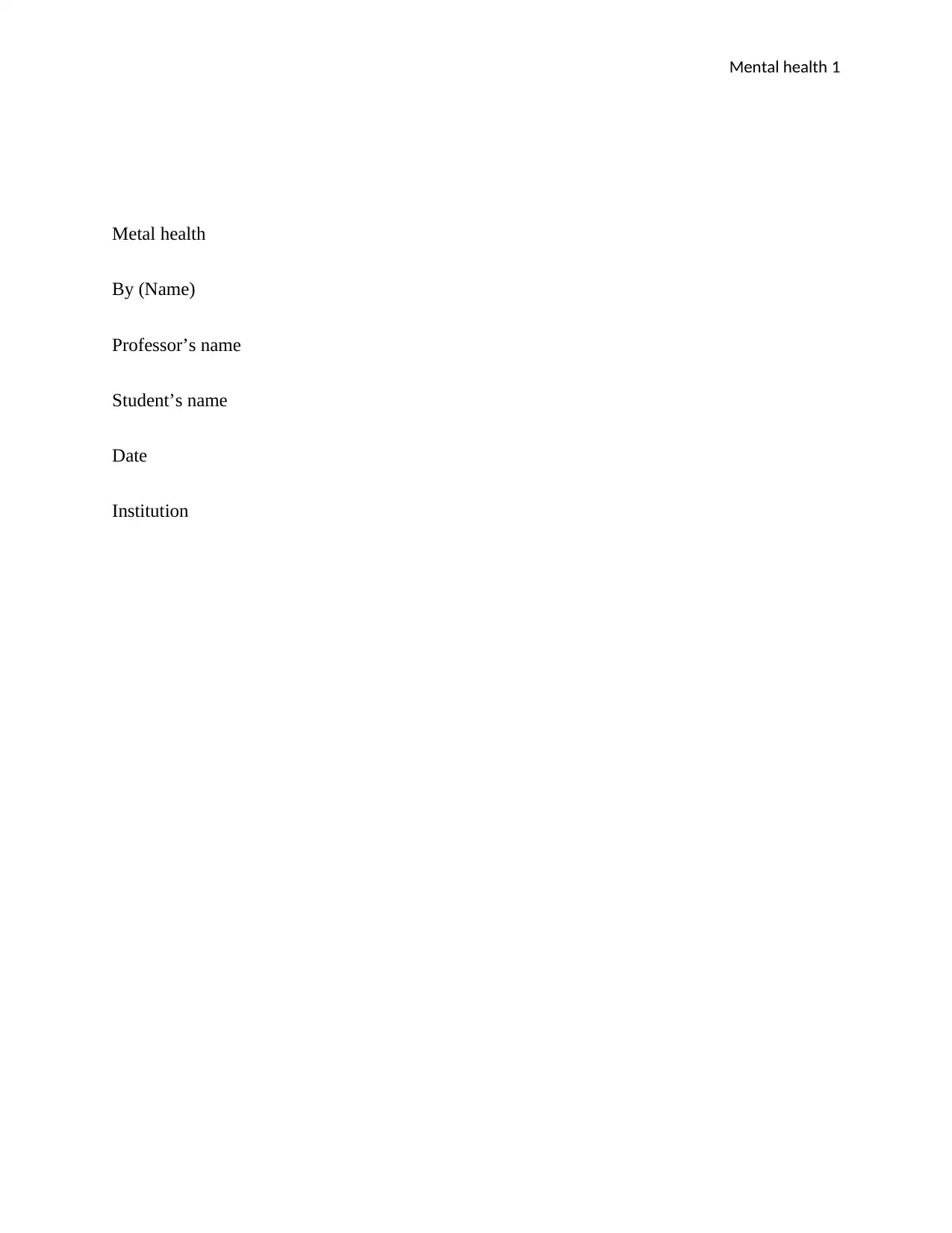
Mental health 1
Metal health
By (Name)
Professor’s name
Student’s name
Date
Institution
Metal health
By (Name)
Professor’s name
Student’s name
Date
Institution
Paraphrase This Document
Need a fresh take? Get an instant paraphrase of this document with our AI Paraphraser
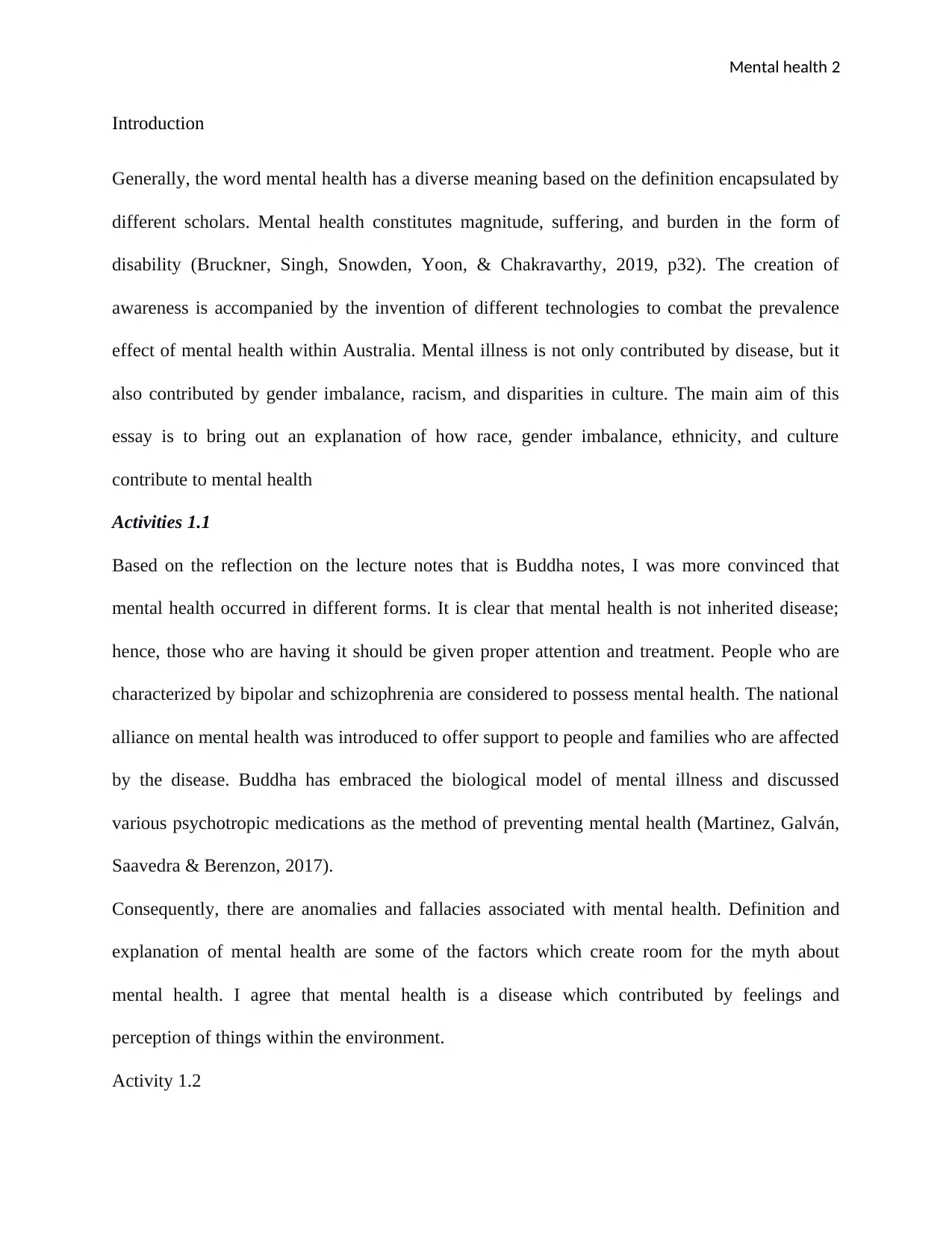
Mental health 2
Introduction
Generally, the word mental health has a diverse meaning based on the definition encapsulated by
different scholars. Mental health constitutes magnitude, suffering, and burden in the form of
disability (Bruckner, Singh, Snowden, Yoon, & Chakravarthy, 2019, p32). The creation of
awareness is accompanied by the invention of different technologies to combat the prevalence
effect of mental health within Australia. Mental illness is not only contributed by disease, but it
also contributed by gender imbalance, racism, and disparities in culture. The main aim of this
essay is to bring out an explanation of how race, gender imbalance, ethnicity, and culture
contribute to mental health
Activities 1.1
Based on the reflection on the lecture notes that is Buddha notes, I was more convinced that
mental health occurred in different forms. It is clear that mental health is not inherited disease;
hence, those who are having it should be given proper attention and treatment. People who are
characterized by bipolar and schizophrenia are considered to possess mental health. The national
alliance on mental health was introduced to offer support to people and families who are affected
by the disease. Buddha has embraced the biological model of mental illness and discussed
various psychotropic medications as the method of preventing mental health (Martinez, Galván,
Saavedra & Berenzon, 2017).
Consequently, there are anomalies and fallacies associated with mental health. Definition and
explanation of mental health are some of the factors which create room for the myth about
mental health. I agree that mental health is a disease which contributed by feelings and
perception of things within the environment.
Activity 1.2
Introduction
Generally, the word mental health has a diverse meaning based on the definition encapsulated by
different scholars. Mental health constitutes magnitude, suffering, and burden in the form of
disability (Bruckner, Singh, Snowden, Yoon, & Chakravarthy, 2019, p32). The creation of
awareness is accompanied by the invention of different technologies to combat the prevalence
effect of mental health within Australia. Mental illness is not only contributed by disease, but it
also contributed by gender imbalance, racism, and disparities in culture. The main aim of this
essay is to bring out an explanation of how race, gender imbalance, ethnicity, and culture
contribute to mental health
Activities 1.1
Based on the reflection on the lecture notes that is Buddha notes, I was more convinced that
mental health occurred in different forms. It is clear that mental health is not inherited disease;
hence, those who are having it should be given proper attention and treatment. People who are
characterized by bipolar and schizophrenia are considered to possess mental health. The national
alliance on mental health was introduced to offer support to people and families who are affected
by the disease. Buddha has embraced the biological model of mental illness and discussed
various psychotropic medications as the method of preventing mental health (Martinez, Galván,
Saavedra & Berenzon, 2017).
Consequently, there are anomalies and fallacies associated with mental health. Definition and
explanation of mental health are some of the factors which create room for the myth about
mental health. I agree that mental health is a disease which contributed by feelings and
perception of things within the environment.
Activity 1.2
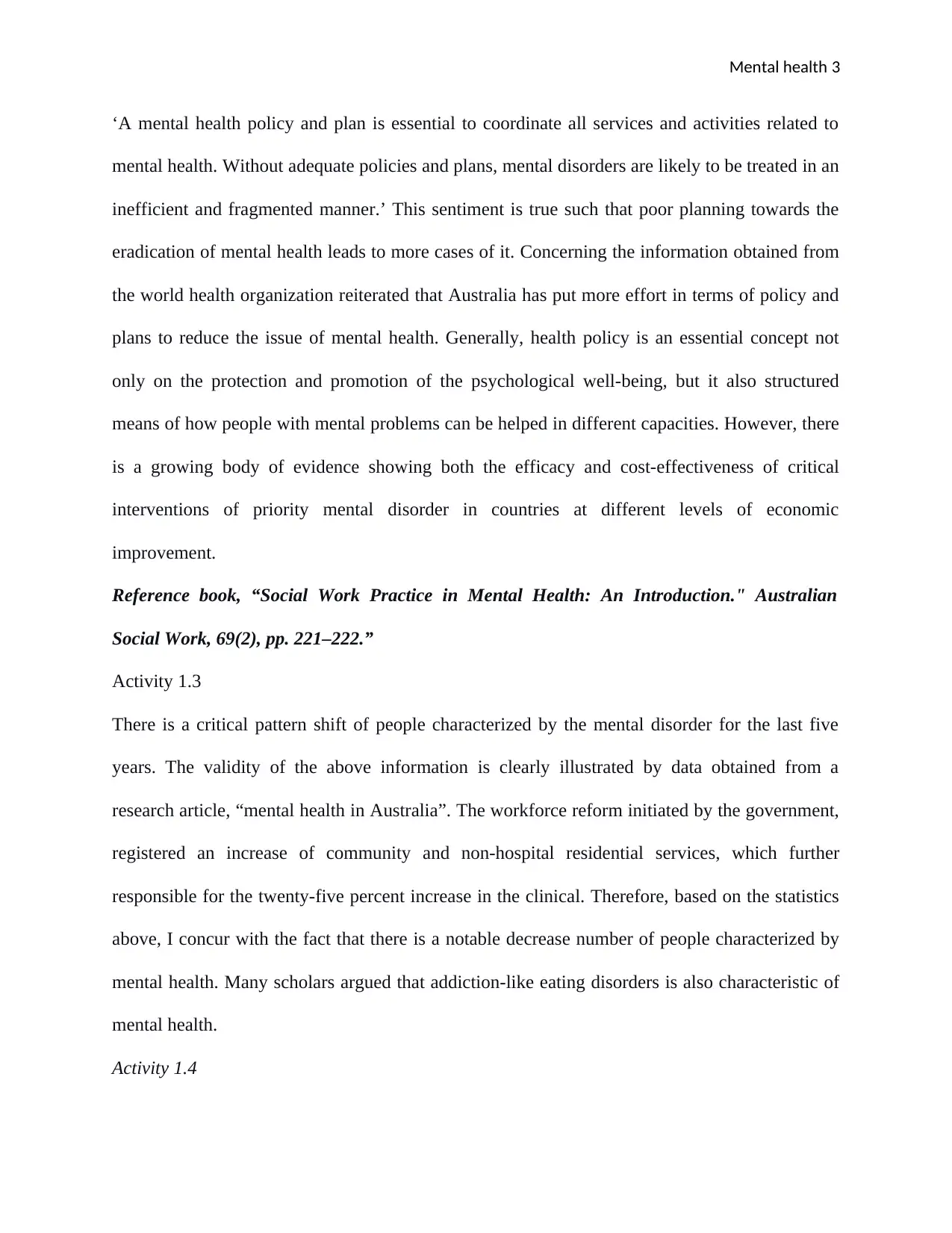
Mental health 3
‘A mental health policy and plan is essential to coordinate all services and activities related to
mental health. Without adequate policies and plans, mental disorders are likely to be treated in an
inefficient and fragmented manner.’ This sentiment is true such that poor planning towards the
eradication of mental health leads to more cases of it. Concerning the information obtained from
the world health organization reiterated that Australia has put more effort in terms of policy and
plans to reduce the issue of mental health. Generally, health policy is an essential concept not
only on the protection and promotion of the psychological well-being, but it also structured
means of how people with mental problems can be helped in different capacities. However, there
is a growing body of evidence showing both the efficacy and cost-effectiveness of critical
interventions of priority mental disorder in countries at different levels of economic
improvement.
Reference book, “Social Work Practice in Mental Health: An Introduction." Australian
Social Work, 69(2), pp. 221–222.”
Activity 1.3
There is a critical pattern shift of people characterized by the mental disorder for the last five
years. The validity of the above information is clearly illustrated by data obtained from a
research article, “mental health in Australia”. The workforce reform initiated by the government,
registered an increase of community and non-hospital residential services, which further
responsible for the twenty-five percent increase in the clinical. Therefore, based on the statistics
above, I concur with the fact that there is a notable decrease number of people characterized by
mental health. Many scholars argued that addiction-like eating disorders is also characteristic of
mental health.
Activity 1.4
‘A mental health policy and plan is essential to coordinate all services and activities related to
mental health. Without adequate policies and plans, mental disorders are likely to be treated in an
inefficient and fragmented manner.’ This sentiment is true such that poor planning towards the
eradication of mental health leads to more cases of it. Concerning the information obtained from
the world health organization reiterated that Australia has put more effort in terms of policy and
plans to reduce the issue of mental health. Generally, health policy is an essential concept not
only on the protection and promotion of the psychological well-being, but it also structured
means of how people with mental problems can be helped in different capacities. However, there
is a growing body of evidence showing both the efficacy and cost-effectiveness of critical
interventions of priority mental disorder in countries at different levels of economic
improvement.
Reference book, “Social Work Practice in Mental Health: An Introduction." Australian
Social Work, 69(2), pp. 221–222.”
Activity 1.3
There is a critical pattern shift of people characterized by the mental disorder for the last five
years. The validity of the above information is clearly illustrated by data obtained from a
research article, “mental health in Australia”. The workforce reform initiated by the government,
registered an increase of community and non-hospital residential services, which further
responsible for the twenty-five percent increase in the clinical. Therefore, based on the statistics
above, I concur with the fact that there is a notable decrease number of people characterized by
mental health. Many scholars argued that addiction-like eating disorders is also characteristic of
mental health.
Activity 1.4
⊘ This is a preview!⊘
Do you want full access?
Subscribe today to unlock all pages.

Trusted by 1+ million students worldwide
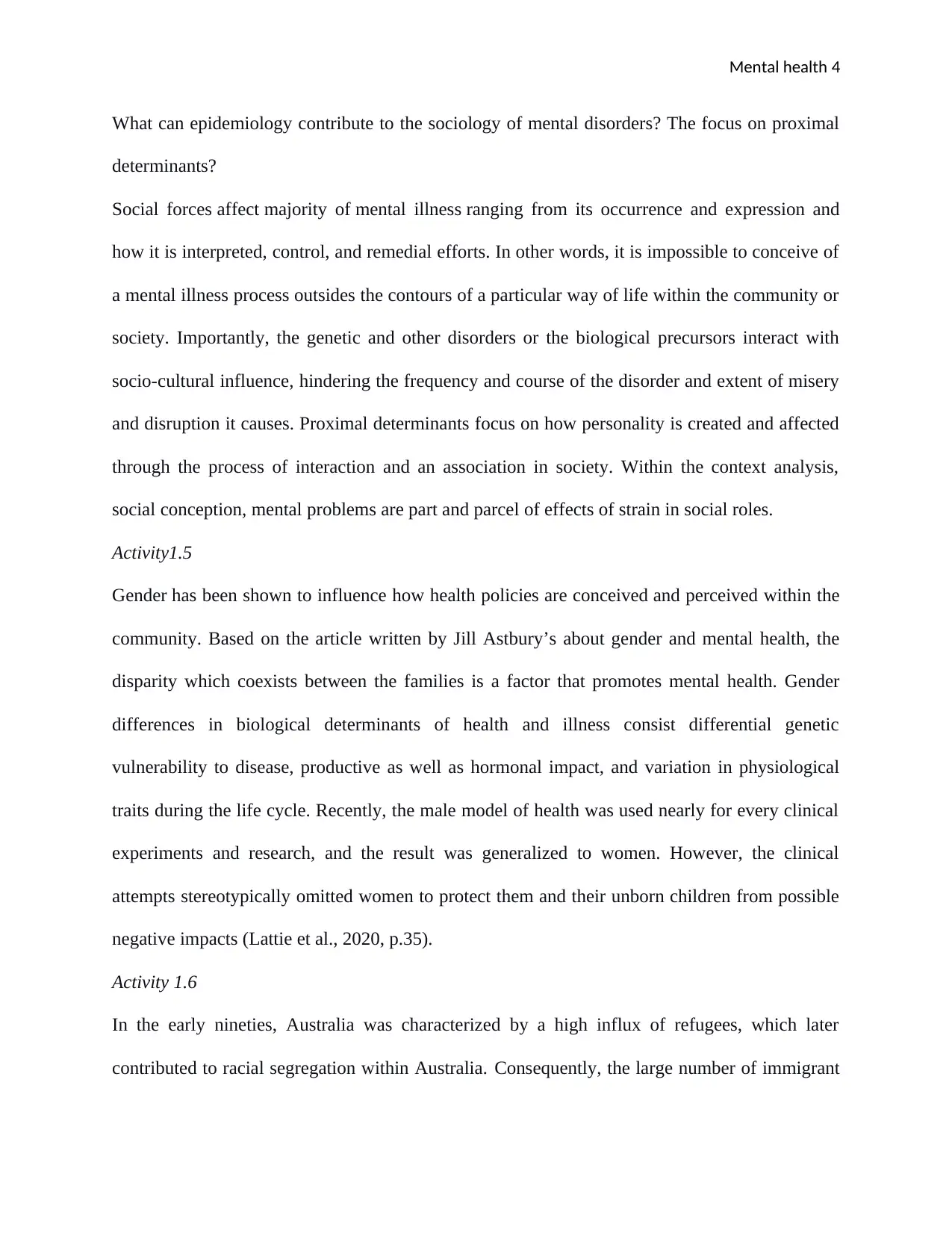
Mental health 4
What can epidemiology contribute to the sociology of mental disorders? The focus on proximal
determinants?
Social forces affect majority of mental illness ranging from its occurrence and expression and
how it is interpreted, control, and remedial efforts. In other words, it is impossible to conceive of
a mental illness process outsides the contours of a particular way of life within the community or
society. Importantly, the genetic and other disorders or the biological precursors interact with
socio-cultural influence, hindering the frequency and course of the disorder and extent of misery
and disruption it causes. Proximal determinants focus on how personality is created and affected
through the process of interaction and an association in society. Within the context analysis,
social conception, mental problems are part and parcel of effects of strain in social roles.
Activity1.5
Gender has been shown to influence how health policies are conceived and perceived within the
community. Based on the article written by Jill Astbury’s about gender and mental health, the
disparity which coexists between the families is a factor that promotes mental health. Gender
differences in biological determinants of health and illness consist differential genetic
vulnerability to disease, productive as well as hormonal impact, and variation in physiological
traits during the life cycle. Recently, the male model of health was used nearly for every clinical
experiments and research, and the result was generalized to women. However, the clinical
attempts stereotypically omitted women to protect them and their unborn children from possible
negative impacts (Lattie et al., 2020, p.35).
Activity 1.6
In the early nineties, Australia was characterized by a high influx of refugees, which later
contributed to racial segregation within Australia. Consequently, the large number of immigrant
What can epidemiology contribute to the sociology of mental disorders? The focus on proximal
determinants?
Social forces affect majority of mental illness ranging from its occurrence and expression and
how it is interpreted, control, and remedial efforts. In other words, it is impossible to conceive of
a mental illness process outsides the contours of a particular way of life within the community or
society. Importantly, the genetic and other disorders or the biological precursors interact with
socio-cultural influence, hindering the frequency and course of the disorder and extent of misery
and disruption it causes. Proximal determinants focus on how personality is created and affected
through the process of interaction and an association in society. Within the context analysis,
social conception, mental problems are part and parcel of effects of strain in social roles.
Activity1.5
Gender has been shown to influence how health policies are conceived and perceived within the
community. Based on the article written by Jill Astbury’s about gender and mental health, the
disparity which coexists between the families is a factor that promotes mental health. Gender
differences in biological determinants of health and illness consist differential genetic
vulnerability to disease, productive as well as hormonal impact, and variation in physiological
traits during the life cycle. Recently, the male model of health was used nearly for every clinical
experiments and research, and the result was generalized to women. However, the clinical
attempts stereotypically omitted women to protect them and their unborn children from possible
negative impacts (Lattie et al., 2020, p.35).
Activity 1.6
In the early nineties, Australia was characterized by a high influx of refugees, which later
contributed to racial segregation within Australia. Consequently, the large number of immigrant
Paraphrase This Document
Need a fresh take? Get an instant paraphrase of this document with our AI Paraphraser
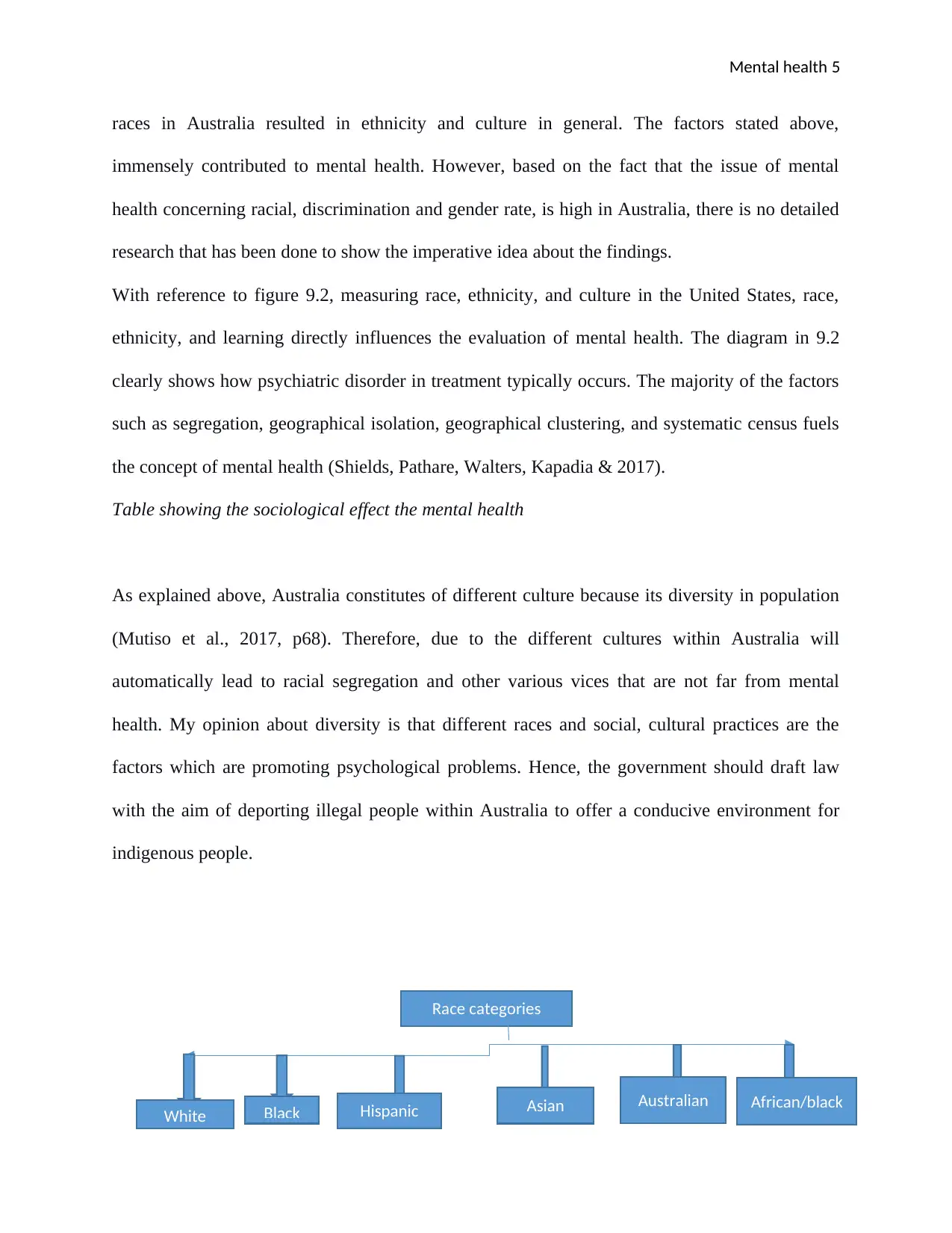
Mental health 5
races in Australia resulted in ethnicity and culture in general. The factors stated above,
immensely contributed to mental health. However, based on the fact that the issue of mental
health concerning racial, discrimination and gender rate, is high in Australia, there is no detailed
research that has been done to show the imperative idea about the findings.
With reference to figure 9.2, measuring race, ethnicity, and culture in the United States, race,
ethnicity, and learning directly influences the evaluation of mental health. The diagram in 9.2
clearly shows how psychiatric disorder in treatment typically occurs. The majority of the factors
such as segregation, geographical isolation, geographical clustering, and systematic census fuels
the concept of mental health (Shields, Pathare, Walters, Kapadia & 2017).
Table showing the sociological effect the mental health
As explained above, Australia constitutes of different culture because its diversity in population
(Mutiso et al., 2017, p68). Therefore, due to the different cultures within Australia will
automatically lead to racial segregation and other various vices that are not far from mental
health. My opinion about diversity is that different races and social, cultural practices are the
factors which are promoting psychological problems. Hence, the government should draft law
with the aim of deporting illegal people within Australia to offer a conducive environment for
indigenous people.
Race categories
White Black Hispanic Asian Australian African/black
races in Australia resulted in ethnicity and culture in general. The factors stated above,
immensely contributed to mental health. However, based on the fact that the issue of mental
health concerning racial, discrimination and gender rate, is high in Australia, there is no detailed
research that has been done to show the imperative idea about the findings.
With reference to figure 9.2, measuring race, ethnicity, and culture in the United States, race,
ethnicity, and learning directly influences the evaluation of mental health. The diagram in 9.2
clearly shows how psychiatric disorder in treatment typically occurs. The majority of the factors
such as segregation, geographical isolation, geographical clustering, and systematic census fuels
the concept of mental health (Shields, Pathare, Walters, Kapadia & 2017).
Table showing the sociological effect the mental health
As explained above, Australia constitutes of different culture because its diversity in population
(Mutiso et al., 2017, p68). Therefore, due to the different cultures within Australia will
automatically lead to racial segregation and other various vices that are not far from mental
health. My opinion about diversity is that different races and social, cultural practices are the
factors which are promoting psychological problems. Hence, the government should draft law
with the aim of deporting illegal people within Australia to offer a conducive environment for
indigenous people.
Race categories
White Black Hispanic Asian Australian African/black
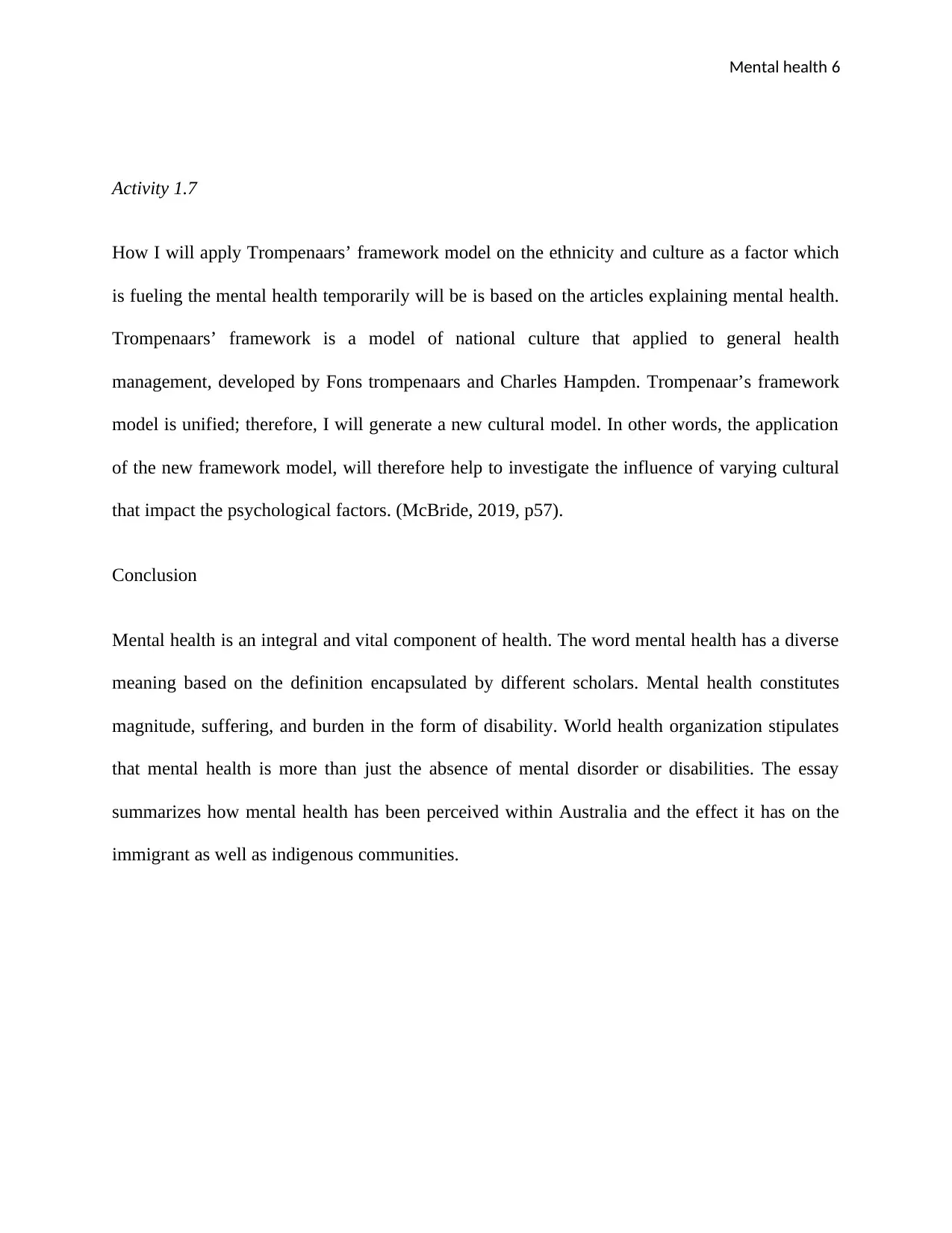
Mental health 6
Activity 1.7
How I will apply Trompenaars’ framework model on the ethnicity and culture as a factor which
is fueling the mental health temporarily will be is based on the articles explaining mental health.
Trompenaars’ framework is a model of national culture that applied to general health
management, developed by Fons trompenaars and Charles Hampden. Trompenaar’s framework
model is unified; therefore, I will generate a new cultural model. In other words, the application
of the new framework model, will therefore help to investigate the influence of varying cultural
that impact the psychological factors. (McBride, 2019, p57).
Conclusion
Mental health is an integral and vital component of health. The word mental health has a diverse
meaning based on the definition encapsulated by different scholars. Mental health constitutes
magnitude, suffering, and burden in the form of disability. World health organization stipulates
that mental health is more than just the absence of mental disorder or disabilities. The essay
summarizes how mental health has been perceived within Australia and the effect it has on the
immigrant as well as indigenous communities.
Activity 1.7
How I will apply Trompenaars’ framework model on the ethnicity and culture as a factor which
is fueling the mental health temporarily will be is based on the articles explaining mental health.
Trompenaars’ framework is a model of national culture that applied to general health
management, developed by Fons trompenaars and Charles Hampden. Trompenaar’s framework
model is unified; therefore, I will generate a new cultural model. In other words, the application
of the new framework model, will therefore help to investigate the influence of varying cultural
that impact the psychological factors. (McBride, 2019, p57).
Conclusion
Mental health is an integral and vital component of health. The word mental health has a diverse
meaning based on the definition encapsulated by different scholars. Mental health constitutes
magnitude, suffering, and burden in the form of disability. World health organization stipulates
that mental health is more than just the absence of mental disorder or disabilities. The essay
summarizes how mental health has been perceived within Australia and the effect it has on the
immigrant as well as indigenous communities.
⊘ This is a preview!⊘
Do you want full access?
Subscribe today to unlock all pages.

Trusted by 1+ million students worldwide
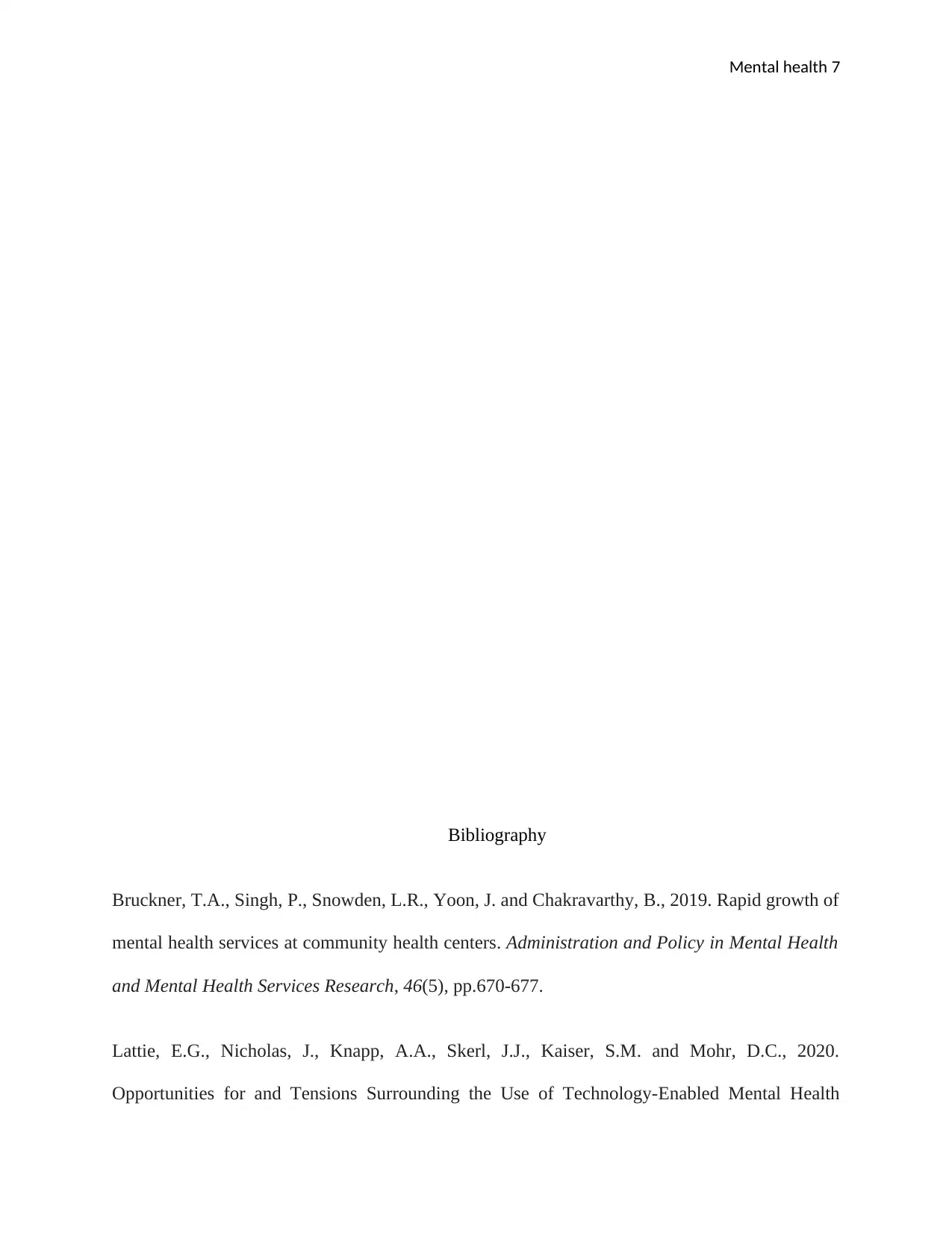
Mental health 7
Bibliography
Bruckner, T.A., Singh, P., Snowden, L.R., Yoon, J. and Chakravarthy, B., 2019. Rapid growth of
mental health services at community health centers. Administration and Policy in Mental Health
and Mental Health Services Research, 46(5), pp.670-677.
Lattie, E.G., Nicholas, J., Knapp, A.A., Skerl, J.J., Kaiser, S.M. and Mohr, D.C., 2020.
Opportunities for and Tensions Surrounding the Use of Technology-Enabled Mental Health
Bibliography
Bruckner, T.A., Singh, P., Snowden, L.R., Yoon, J. and Chakravarthy, B., 2019. Rapid growth of
mental health services at community health centers. Administration and Policy in Mental Health
and Mental Health Services Research, 46(5), pp.670-677.
Lattie, E.G., Nicholas, J., Knapp, A.A., Skerl, J.J., Kaiser, S.M. and Mohr, D.C., 2020.
Opportunities for and Tensions Surrounding the Use of Technology-Enabled Mental Health
Paraphrase This Document
Need a fresh take? Get an instant paraphrase of this document with our AI Paraphraser
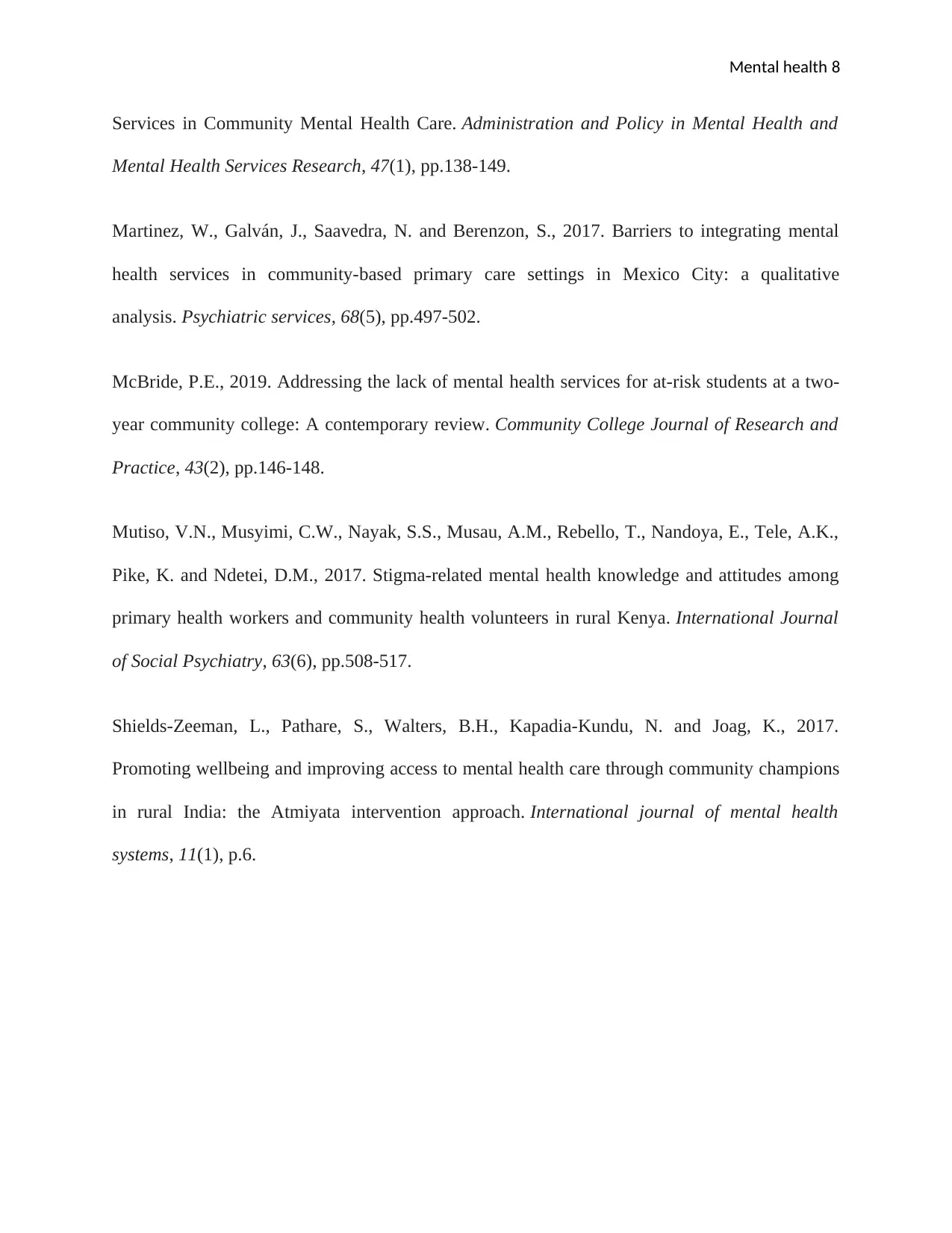
Mental health 8
Services in Community Mental Health Care. Administration and Policy in Mental Health and
Mental Health Services Research, 47(1), pp.138-149.
Martinez, W., Galván, J., Saavedra, N. and Berenzon, S., 2017. Barriers to integrating mental
health services in community-based primary care settings in Mexico City: a qualitative
analysis. Psychiatric services, 68(5), pp.497-502.
McBride, P.E., 2019. Addressing the lack of mental health services for at-risk students at a two-
year community college: A contemporary review. Community College Journal of Research and
Practice, 43(2), pp.146-148.
Mutiso, V.N., Musyimi, C.W., Nayak, S.S., Musau, A.M., Rebello, T., Nandoya, E., Tele, A.K.,
Pike, K. and Ndetei, D.M., 2017. Stigma-related mental health knowledge and attitudes among
primary health workers and community health volunteers in rural Kenya. International Journal
of Social Psychiatry, 63(6), pp.508-517.
Shields-Zeeman, L., Pathare, S., Walters, B.H., Kapadia-Kundu, N. and Joag, K., 2017.
Promoting wellbeing and improving access to mental health care through community champions
in rural India: the Atmiyata intervention approach. International journal of mental health
systems, 11(1), p.6.
Services in Community Mental Health Care. Administration and Policy in Mental Health and
Mental Health Services Research, 47(1), pp.138-149.
Martinez, W., Galván, J., Saavedra, N. and Berenzon, S., 2017. Barriers to integrating mental
health services in community-based primary care settings in Mexico City: a qualitative
analysis. Psychiatric services, 68(5), pp.497-502.
McBride, P.E., 2019. Addressing the lack of mental health services for at-risk students at a two-
year community college: A contemporary review. Community College Journal of Research and
Practice, 43(2), pp.146-148.
Mutiso, V.N., Musyimi, C.W., Nayak, S.S., Musau, A.M., Rebello, T., Nandoya, E., Tele, A.K.,
Pike, K. and Ndetei, D.M., 2017. Stigma-related mental health knowledge and attitudes among
primary health workers and community health volunteers in rural Kenya. International Journal
of Social Psychiatry, 63(6), pp.508-517.
Shields-Zeeman, L., Pathare, S., Walters, B.H., Kapadia-Kundu, N. and Joag, K., 2017.
Promoting wellbeing and improving access to mental health care through community champions
in rural India: the Atmiyata intervention approach. International journal of mental health
systems, 11(1), p.6.
1 out of 8
Related Documents
Your All-in-One AI-Powered Toolkit for Academic Success.
+13062052269
info@desklib.com
Available 24*7 on WhatsApp / Email
![[object Object]](/_next/static/media/star-bottom.7253800d.svg)
Unlock your academic potential
Copyright © 2020–2026 A2Z Services. All Rights Reserved. Developed and managed by ZUCOL.





